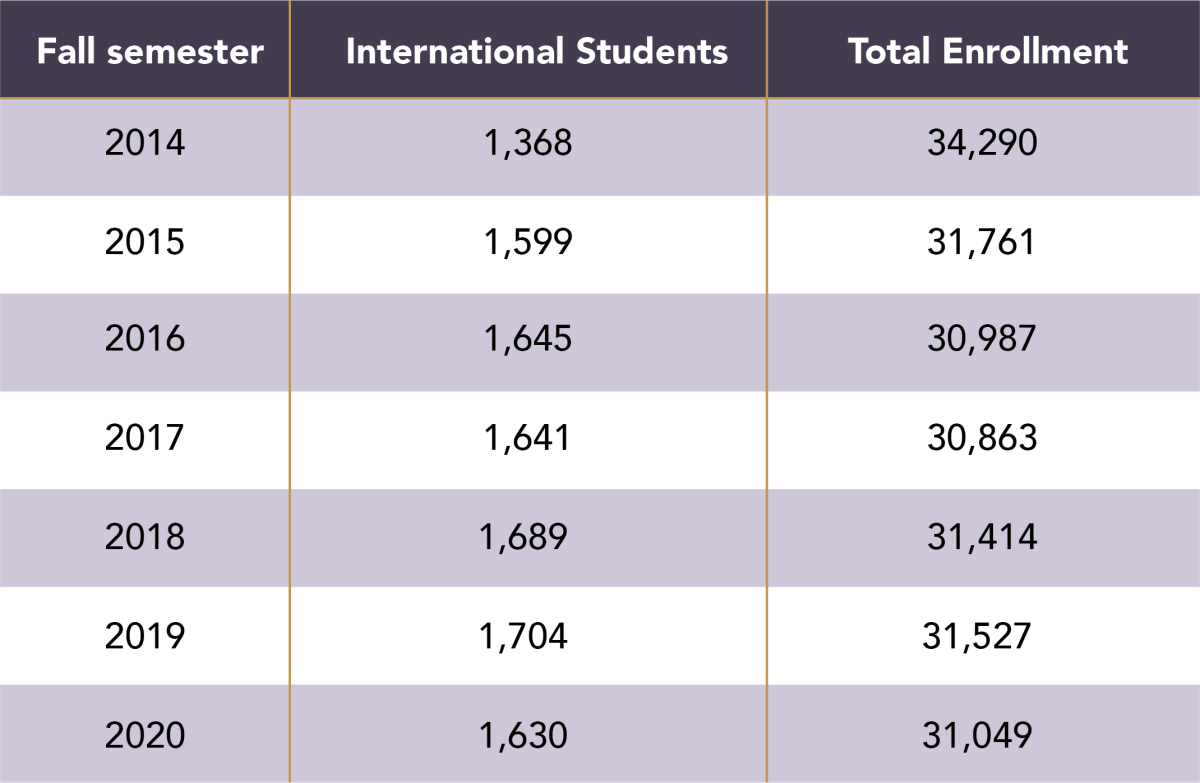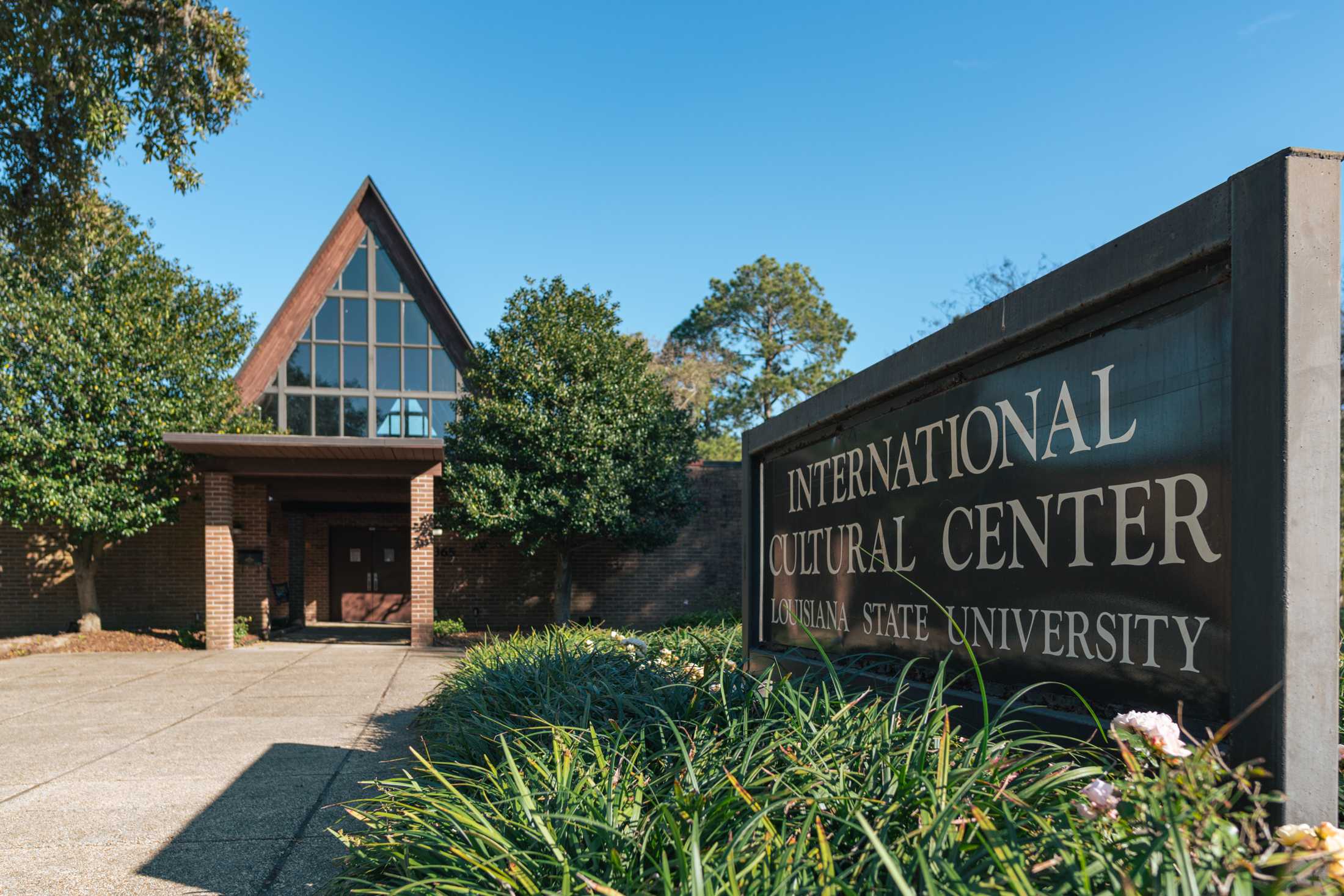Total international student enrollment at LSU decreased by 15% in the fall of 2020 and reached its lowest point since 1991, according to data provided by the University’s Office of Budget and Planning.
The drop at LSU coincides with national trends, which show international enrollment at higher education institutions in the United States decreasing 16% last semester, according to a survey conducted by the Institute of International Education.
“The drop in enrollment this year wasn’t surprising to anyone given the challenges and hurdles that the pandemic created,” Samba Dieng, executive director of LSU’s International Programs, said. “Most U.S. consulates were closed, making it impossible for students to secure visas for the fall of 2020 term. Border closures and country restrictions also added significant challenges to student mobility in general.”
The shift to online classes and the isolation caused by shutdowns while being so far away from home has been difficult for some international students, including Moses Okonkwo, an LSU graduate student from Nigeria studying geography.
“It’s ruined the experience of being in a new country and in graduate school altogether,” Okonkwo said. “For those that are locals, you can go back and do school from home. But this isn’t home for international students who arrived shortly before the pandemic. The difficulty of isolation is — it drives you crazy.”
Okonkwo said he went home at the end of 2019 before returning to Louisiana in January 2020, the last time he was able to see his family.
“I have been here ever since, confined to the boring walls of my apartment,” he said. “I don’t think it’s a good time to be away from family and friends. Generally, it’s not a good time to be a student, I would say.”
LSU alumnus Amrat Gandhi, founder of LSU’s International Alumni Chapter, said he has friends back home who planned to come to LSU but deferred their enrollment last fall, choosing to wait until the pandemic ends.
Ninety percent of institutions in the survey reported international student deferrals in fall 2020.
Construction management graduate student Shashank Muley, vice president of LSU’s International Student Association, said the pandemic isn’t the only reason international student enrollment has decreased.
Even before the pandemic, new international enrollment in the U.S. was in decline, with numbers falling for the fourth year in a row in the fall of 2019, according to the Institute of International Education.
“It started with the travel ban, frankly,” Muley said.
Former President Donald Trump signed an executive order one week into his presidency that banned foreign nationals from seven predominantly Muslim countries.
“I believe there were a series of events happening that have put a blockade in international students’ minds that coming to the U.S. might be risky,” Muley said.
In July 2020, Immigration and Customs Enforcement announced international students pursuing degrees at U.S. colleges and universities could not remain in the country if they were enrolled in a fully online course load.
“I wouldn’t want to apply to come to the United States knowing the government will ask you to go back home overnight in the middle of a raging pandemic,” Okonkwo said. “I had an exam on the day they made that pronouncement. I didn’t know what to think at the time but it was terrible.”
Okonkwo said he would do things differently if he could go back in time, possibly choosing to pursue his graduate degree in another country with a similar quality of education as the U.S., such as the U.K. or Canada.
ICE reversed the regulation one week later after legal pressure from universities across the country.
Interim President Thomas Galligan assured international students that the University would offer in-person classes so students would not have to leave the country if the order stood.
Muley, Gandhi and Okonkwo agreed that the University did well to protect international students during those times.
Dieng said the long-term trend of decreasing international enrollment is what worries him most.
“That trend simply illustrates a couple of things: a) unfriendly immigration policies in the U.S. may have contributed to this drop in enrollment since 2016 and b) other countries such as Canada, Australia and the U.K. have made significant efforts in attracting international students to their home institutions, making it more difficult to recruit and retain students,” Dieng said.
The decrease in enrollment has serious consequences for LSU and higher education across the country.
Robb Brumfield, associate dean of research and administration of LSU’s College of Science, said many LSU students’ first time interacting with someone from a different country is on LSU’s campus.
“A healthy university has an international population,” he said. “If you’re missing that or it’s greatly diminished, you’re missing out on one of the key elements of a university education.”
International students in Louisiana generated $250.2 million and supported 2,691 jobs during the 2019-2020 academic year, according to a study conducted by the Association of International Educators.
International students disproportionately select into STEM and research-related fields at LSU, causing concerns for the College of Science, which relies heavily on international talent.
Brumfield said about half of the students working in his research lab are international students.
“When people bring a different background to a problem and different personalities, they look at it from a different way,” Brumfield said. “That’s how you get innovation and transformative ideas.”
Brumfield said the department can’t control immigration policy, the pandemic or international competition. All it can do to attract more international talent to the University, according to him, is to continue providing professors the resources they need to secure research grants.
“A lot of our international graduate student recruitment is directly linked — almost 100% correlated — to the productivity of research,” Brumfield said.
He said the more grants the department is able to bring in from the National Science Foundation and the National Institute of Health, the more opportunities it has to recruit students.
“We need to have that if we want LSU to continue to prosper,” he said.





